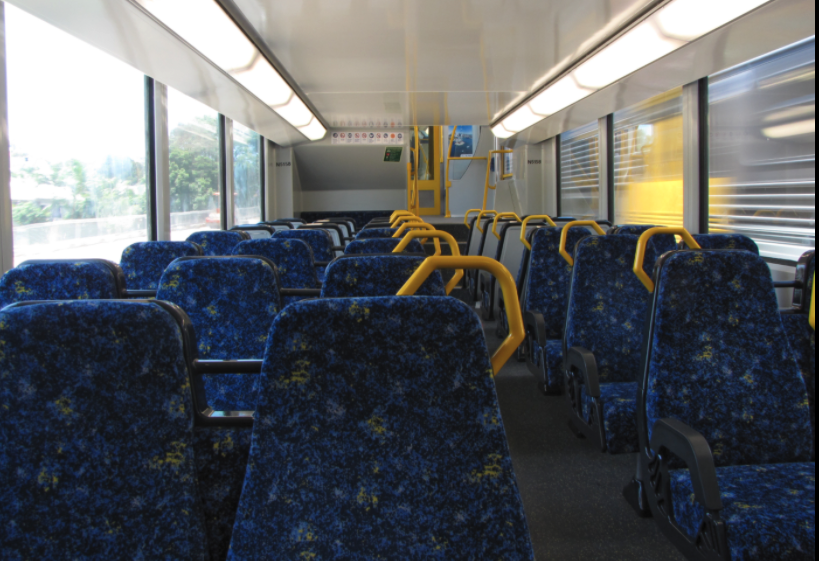You’d just taken your seat for an hour-long train ride when you noticed a slimy object stuck to your freshly pressed clothes. What would you think if something like this happened to you in real life? Isn’t it certain that it will ruin your day? People, a piece of gum can spoil anyone’s day.
As passengers, we must all take responsibility for maintaining the cleanliness of our public transportation. Utility vehicles, in all types and sizes, are indispensable in our daily lives. It enables us to travel to and from different places with ease.
In the real sense, public transportation systems have made a significant contribution to traffic management and CO2 emission reduction. Regardless of its contribution, some passengers dismiss the fact that their inconsiderate behaviour can ruin someone else’s day.
We should not be reliant on utility workers to tidy up. We must be considerate and sensitive in not littering or dumping rubbish in public transportation.
If you continue to do so, allow us to educate you on the consequences of illegal littering & dumping on NSW Public Trains.
Most Common Items Dumped on NSW Trains

Before we get into our main topic, we’ll show you some of the most common items that passengers leave in our train cars.
- Food wrappers such as candy wrappers and small plastic packaging
- Pieces of paper
- Candy wrappers
- Plastic water bottles
- Plastic and metal bottle caps
- Plastic lids
- Gum
Not all public transportation in New South Wales allows passengers to eat and drink on board. Fines may apply if you are caught eating or drinking in transportation where it is not permitted. Other services, however, allow eating and drinking (non-alcoholic) as long as you take your rubbish with you.
And have you noticed that most of the items in our public transportation are made of plastic? Plastic has already made its way into our oceans, land, and public transportation.
Aside from plastic rubbish items, there are valuable items passengers leave behind such as:
- Mobile phones
- Wallets
- Earphones
- Umbrellas
- Handbags
- Glasses
- And other unusual items such as a pendulum clock, wheelchair, etc.
If you lost an item during your last trip, you can submit or lodge a claim for it. Do not hesitate to contact your local transportation service if you have lost or misplaced your valuables.
Fines for Littering & Dumping on NSW Trains
Littering, dumping, or depositing your unwanted items is against the law, whether inside the train or in the immediate neighbourhood. If you’re caught, you’ll be fined and obliged to pay for your irresponsible behaviour.
Before we show you the fines, let’s first understand what our law says and where it stands about littering.
What is Litter?
Under Section 144A of the POEO Act, any of the following is considered litter by the EPA.
a) any domestic or commercial refuse, debris, or rubbish deposited in or on a place. Whether solid, liquid or not it has any value when or after being deposited in or on the place, including:
- any glass
- metal
- cigarette butts
- paper, fabric
- wood
- food
- abandoned vehicles
- abandoned vehicle parts
- construction or demolition material
- garden remnants
- clippings, soil, sand, or rocks
b) any other material, substance, or items deposited in or on a place if its size, shape, nature, or volume makes the place where it has been deposited disorderly or has a negative impact on its proper use.
What is Depositing Litter?
According to the EPA, “depositing litter” refers to the intentional throwing or dropping of any rubbish item. Section 144A of the POEO Act continues to address this issue including:
a) throwing or dropping litter in, on, into, or onto the area, or
(b) leaving litter in or on the location, or
(c) disposing of litter in such a way that it falls, descends, blows, is washed, percolates, or otherwise escapes, or is likely to fall, descend, blow, be washed, percolates, or
(d) causing, allowing, or permitting litter to fall, descend, blow, be washed, percolate, or otherwise escape into or onto the place.
Penalties for littering
Any rubbish, no matter how small or large, is harmful to the environment. So it’s only wise that any lawbreaker will be fined in order to deter them from doing it again in the future. Let us be responsible today and in the days ahead. Let’s put our rubbish in the right receptacle.
The litter law applies to every individual, corporations including advertising material. Whether it’s intentional or not, you will face the following littering penalties:
- $80 for small items like bottle tops and cigarette butts.
- $250 for littering in general
- Individuals will be fined $250 for littering from a vehicle, while corporations will be fined $500.
- Littering in aggravated or dangerous circumstances, such as leaving a syringe or a lit cigarette, costs $450 for individuals, $900 for corporations.
Illegal littering, regardless of its shape or size, inside a public train or in your neighbourhood, will result in penalties.
We should not be ignorant of the rules and regulations; instead, let us educate ourselves. It never hurts to learn about littering laws. This will not only keep us safe but also help keep our public transportation clean.
You can learn more about littering laws by visiting the Environment Protection Authority’s website.
Report Litterers
Aside from passengers littering on public transportation, there are people who litter illegally from their vehicles.
If you see someone littering, you can report it using your mobile phone by using the Report to EPA website. If this is your first time creating a report, you must first register or create an account.
To avoid false or malicious reporting, your report will be thoroughly validated. So, before you post them, make sure you have enough proof.
The NSW Government is committed to combating and reducing waste generated by illegal litterers. Your small acts and contributions can make a big difference.
Top 10 Facts About Littering
Litter, whether on public transportation, on the sidewalks, or anywhere else in public, has a negative impact on the environment. Regardless of how unsightly the rubbish is, some people do not care about properly disposing of it.
Let us demonstrate some facts about littering and its effects on our environment, health, marine life, and other environmental variables.
- The annual national cost of litter services is estimated to be between $300 million and $350 million.
- Litter consumes approximately 95% of available management resources, with the remaining 5% used to prevent littering.
- Litter can clog drains, causing flooding and forcing local governments to spend millions of dollars on repairs.
- People are at risk from litter, which includes glass shards, needles, and syringes.
- Litter, such as lit cigarettes thrown from a moving vehicle, is a fire hazard.
- Every year, approximately 7 billion cigarette butts are littered in Australia.
- Litter, such as cigarette butts, plastic bags, and other types of plastic items, endangers animal and marine life in a variety of ways, including the following:
- Because they pollute the water in which they live
- When they misinterpret litter for food and eat it
- When they become entangled in plastic items and sustain injuries or strangulation
- 95 percent of beach litter originates on suburban streets, in storm drains, or in a stormwater system
- Cigarette butts remain the most littered item in New South Wales, accounting for 43% of all littered items.
- Water Corporation has 70 stormwater improvement devices around Sydney that recover roughly equal amounts of litter and sediment. This indicates that there is a significant amount of litter and sediment recovery.
Therefore, irresponsible behaviour contributes significantly to the destruction of our environment. And when our immediate environment is harmed, it negatively affects human health as well as the health of other living creatures.
Conclusion
Some passengers are completely unaware of their poor behaviour. Others have no intention of leaving their rubbish. Regardless of their reasons, the wrongdoing is not excused, and you will be fined accordingly if caught.
If everyone follows the rule, there will be no littering law. Disposing of our rubbish properly is a moral obligation. We should be responsible for maintaining our surroundings safe and clean.
Let us all share the responsibility of keeping our public transportation clean. Isn’t it we who benefit from the convenience of our transportation system? Be a part of the solution by disposing of your rubbish in the appropriate receptacle.







